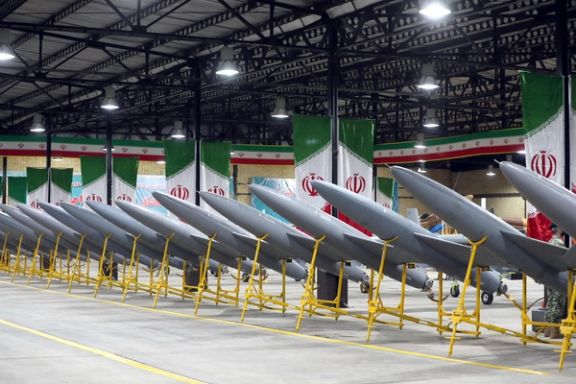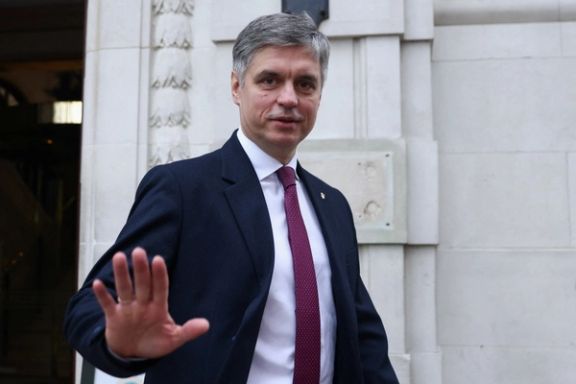Iran Cashes In On Russia Running Low On Munition

Documents seen by the UK’s Sky News suggest that Iran is profiteering from Russia’s war in Ukraine.

Documents seen by the UK’s Sky News suggest that Iran is profiteering from Russia’s war in Ukraine.
Overpriced ammunition shows the cash-strapped regime is able to charge over the going price as fellow sanctions-hit Russia runs low on supplies.
The 16 pages of top-secret documents, dated September 14, 2022, appears to be for samples of varying sizes of artillery and tank shells and rockets worth just over $1m.
A table on page five of the supplementary section covers samples of ammunition and weapons worth $741,860, including two 125mm barrels for the 2A46M gun of a T72 tank - each barrel priced at $85,750 - and two 122mm barrels for a D-30 Howitzer artillery piece - at a cost per barrel of $54,750.
The supplement also lists parts of ammunition to be sent, including 12 pieces respectively of the "shell body" and "brass case" of 122mm and 152mm ammunition.
The total for just 1,000 rounds adds up to $1,013,100, above market value. Colonel Hamish de Bretton-Gordon, a former army officer, told Sky News he thought this was expensive for such a relatively small quantity. "Let's hope the Iranians are ripping [Vladimir] Putin off,” he said.
Speaking to Sky News, Ukraine’s ambassador in the UK, Vadym Prystaiko, said: "That they're actually talking about simple stuff like the armaments, like ammunition, this is showing that the Russian position is quite difficult indeed."

If true, it is further evidence of Iran’s supporting the war in Ukraine. Several global powers including the US and UK have issued sanctions on Iran for supplying Russia with drones on its war in Ukraine which have attacked civilians and civilian infrastructure.
Earlier this year, Sky News also reported allegations that Iran supplied large quantities of bullets and ammunition to Russia via cargo ships on the Caspian Sea in January. The transaction also dated back to September 2022.
Speaking to Sky News, Jack Watling, a senior research fellow at the Royal United Services Institute, who has spent a lot of time in Ukraine covering the war and is also an expert on Iran, said it would make "perfect sense" for Moscow and Tehran to agree contracts for arms sales. "There was nothing in there that struck me as making it incredible," Mr Watling said, referring to the documents.
"It seemed perfectly reasonable. The timing matched up with when we started to see certain transfers being made. And there were a lot of specific details, like, for example, the use of Swiss jurisdiction for arbitration in the case of a dispute between the parties that also looked quite credible in terms of previous Iranian practice."
Headlined "In the name of Allah", the contract "for the delivery of ammunition" is allegedly between the Ministry of Defence and Logistics of the Armed Forces of Iran and Russia's state military exporting and importing company, JSC Rosoboronexport. The agreement is identified by this number: NoIR-RU-2022 6001/1/NoP/2236478020960.
The document, drawn up in English, is split into sections - each with a numbered article - like any normal contract. Key details are listed like payment for the samples of ammunition - $1,013,100 (£813,000).
An internationally recognised set of regulations and terms that underpin trade deals, known as the INCOTERMS, or International Commercial Terms, are cited - making the covert sale of arms seem almost mundane.
One paragraph reads: "5.9 Right of ownership and risk of loss or damage of the subject of the contract shall be transferred from the supplier to the customer under terms and conditions of FOB/INCOTERMS 2010.”
This section on the transportation of the goods, also reveals the plan was to fly the ammunition samples to Russia from Iran. They must be delivered within 10 working days after payment.
Article eight sets out how the contract is governed by a private codification of international contract law known as the UNIDROIT Principles. These principles are approved by an inter-governmental organisation called the International Institute for the Unification of Private Law (UNIDROIT), which has more than 60 member states, including Iran and Russia but also the UK, the US and other Western allies.
The contract says any dispute that cannot be settled amicably would be dealt with by Swiss arbitration in Zurich, in spite of the fact that Switzerland has imposed sanctions on Iran for the provision of its deadly drones to Russia, wreaking havoc on Ukrainian cities.
Sky News has not been able to verify the authenticity of the documents independently and there has been no official government response from Iran or Russia.